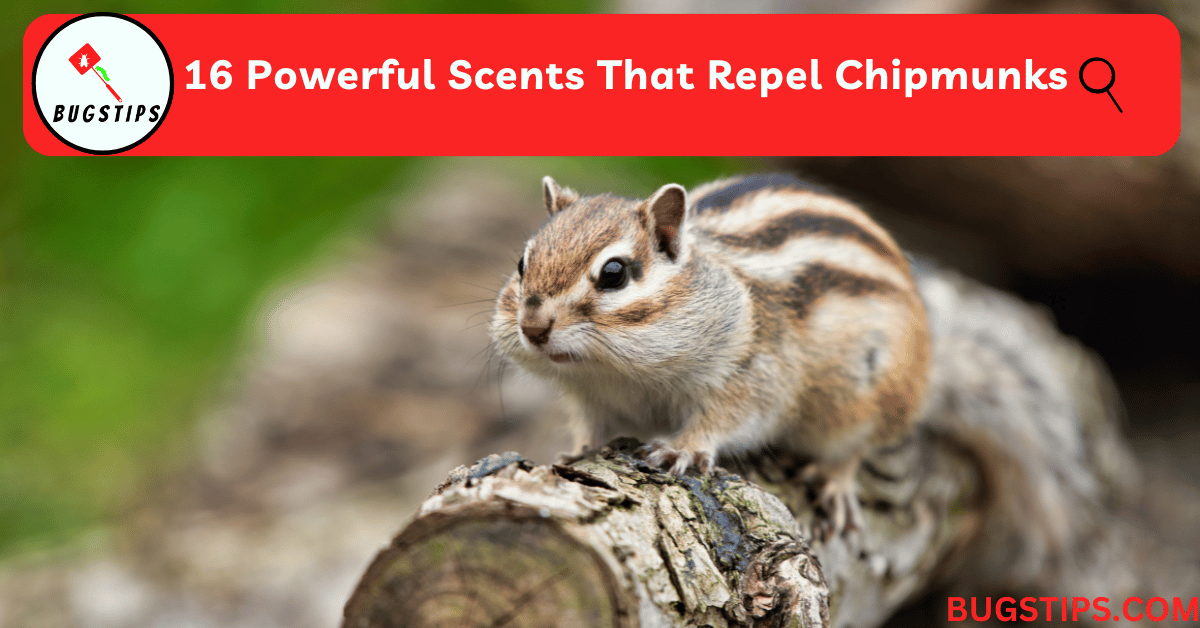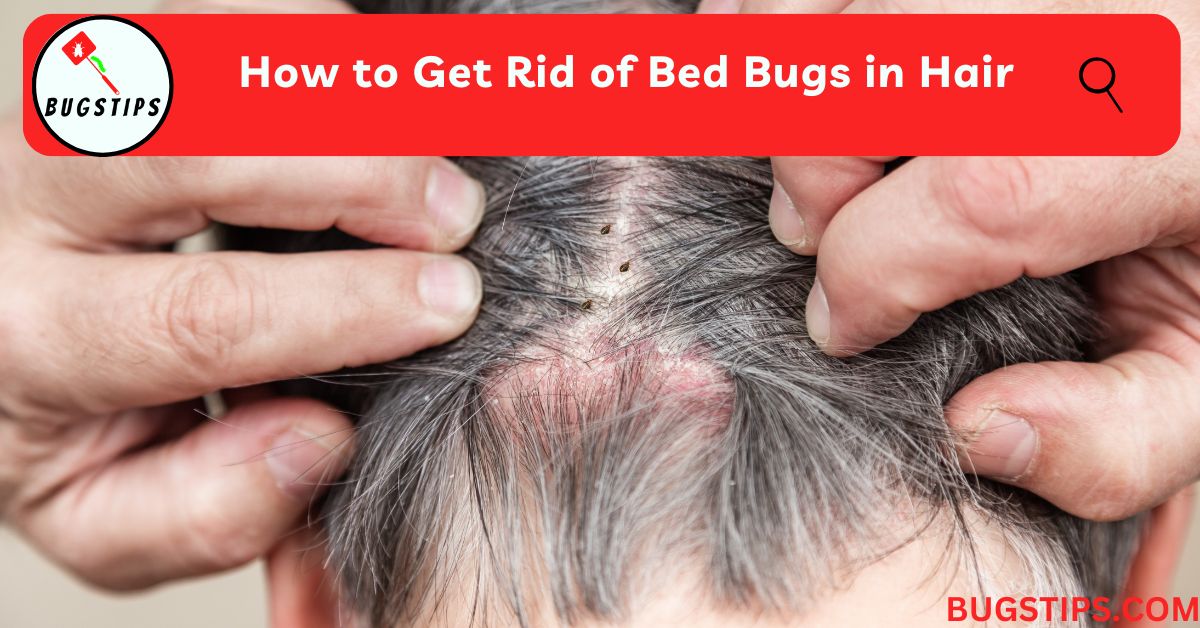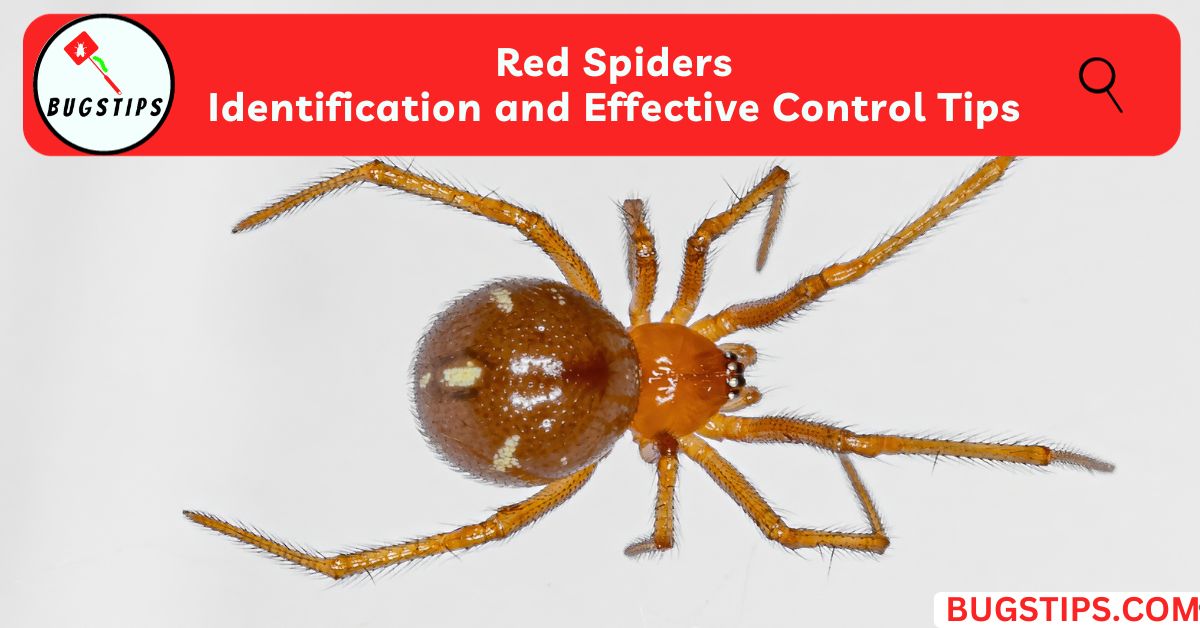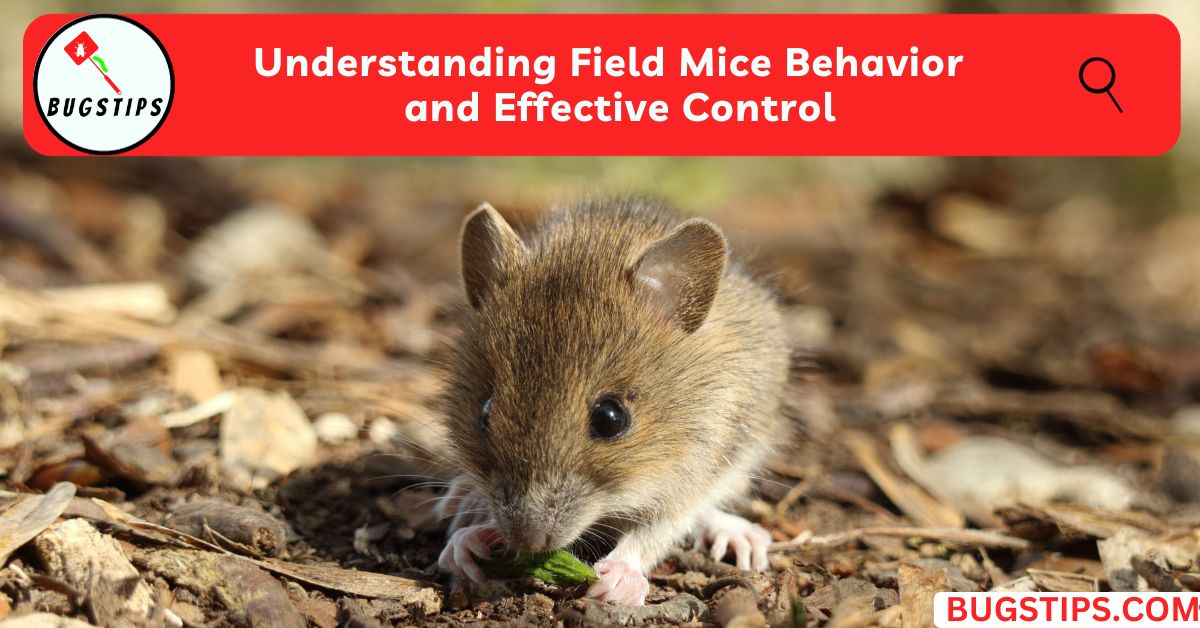This post may contain affiliate links which means as an Amazon Associate, this site may earn a small commission on qualified purchases made through links at no extra cost to you. Learn more on Affiliate Disclosure
Chipmunks are cute and fascinating creatures, but their presence in your garden or home can sometimes become a nuisance.
If you’re looking for natural scents that repel chipmunks and a humane way to keep chipmunks away, scents can be an effective solution.
Chipmunks rely heavily on their sense of smell, so certain odors can repel them and deter them from entering your property.
In this article, we will explore a range of scents that repel chipmunks and provide tips on how to use them effectively.
Scents That Repel Chipmunks
When it comes to dealing with chipmunks, many people are hesitant to use toxic chemicals or harsh methods.
Luckily, many natural scents and substances can repel these critters without harming them or the environment.
Here we’ll explore a variety of scents that repel chipmunks and substances that are effective at repelling chipmunks.
Here are some of the top scents and substances we’ll be covering:
- Essential oils (specifically peppermint and lavender)
- Vinegar
- Garlic
- Onion
- Cayenne pepper
- Cinnamon
- Coffee grounds
- Epsom salt
- Citrus peels
- Cedar mulch
- Mothballs
- Ammonia
- Predator urine
You might be surprised at some of the items on this list and how they can be used to keep chipmunks at bay.
We’ll delve into the details of each one and explain how to use them effectively.
You May Also Like – Can Squirrels Die From Falling? The Amazing
Using Essential Oils to Repel Chipmunks

Essential oils are a popular natural solution for repelling chipmunks.
They work by emitting a strong scent that chipmunks find unpleasant, causing them to avoid the area.
Peppermint oil and lavender oil are two essential oils that have been found to be particularly effective at repelling chipmunks.
Here’s how to use peppermint oil and lavender oil to repel chipmunks.
- Fill a spray bottle with water.
- Add 10-15 drops of peppermint oil or lavender oil to the spray bottle.
- Shake the bottle well to mix the oil with the water.
- Spray the solution around the areas where you’ve seen chipmunk activity, such as gardens, flower beds, or near your home’s foundation.
- Reapply the solution every few days or after rain, as the scent will fade over time.
You can also soak cotton balls in the essential oil and place them in areas where chipmunks are known to frequent, such as near their burrows or in your garden.
However, be careful not to place them in areas where pets or children could come into contact with them.
Remember that essential oils are highly concentrated and should be used with caution. Always test a small area first to ensure that the oil won't damage plants or surfaces. Additionally, essential oils should not be applied directly to the skin or ingested.
Related Article – Squirrel Poop vs Rat Poop: A Detailed Comparison
Does Vinegar Repel Chipmunks?

Vinegar, a common household ingredient, can be an effective natural solution for repelling chipmunks.
The strong odor of vinegar is known to be unpleasant to these small rodents, making it a useful tool in deterring them from your property.
Here’s how to use vinegar as a chipmunk repellent.
- Get a spray bottle and fill it halfway with vinegar.
- Fill the other half with water and shake the bottle well to mix.
- Spray the solution around areas where you’ve seen chipmunk activity, like gardens or near your home.
- Repeat every few days or after it rains, as the scent will wear off over time.
While vinegar can be effective at repelling chipmunks, it may also have a strong odor that some people find unpleasant.
Additionally, vinegar can damage plants if it is applied directly to their leaves or stems, so it should be used with caution in gardens or flower beds.
You May Also Like – What Do Raccoons Eat? The Fascinating Diet
Using Garlic, Onion, and Cayenne Pepper to Repel Chipmunks
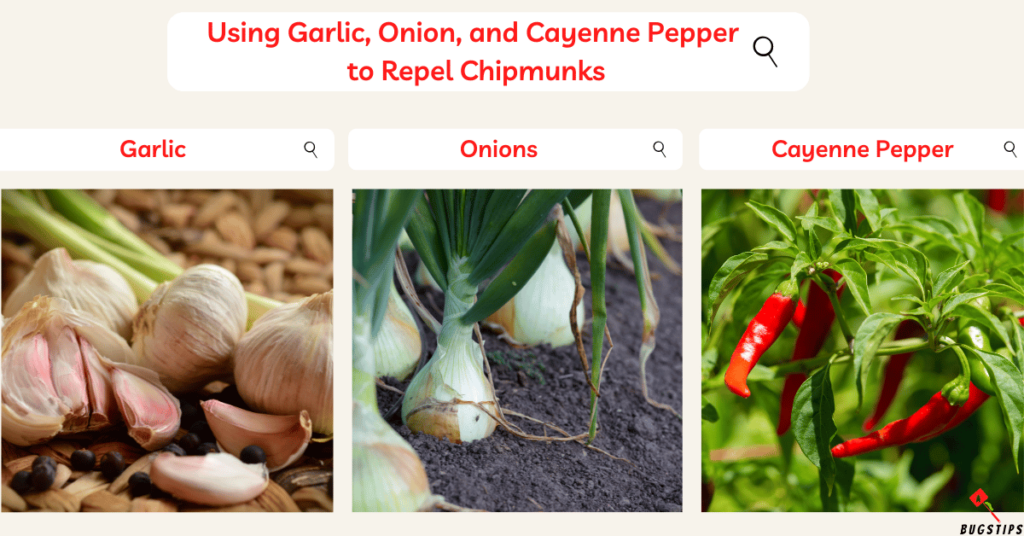
Garlic, onion, and cayenne pepper are all-natural substances that can be used to repel chipmunks.
Each of these substances emits a strong odor that is unpleasant to chipmunks and can help keep them away from areas where they are applied.
Do Chipmunks Hate the Smell of Garlic?
Chipmunks do not like the smell of garlic. The pungent odor that garlic emits can be enough to keep chipmunks away from an area.
You can use garlic as a repellent by crushing cloves of garlic and scattering them around areas where chipmunks are active.
Alternatively, you can create a garlic spray by mixing crushed garlic with water and spraying it around the area.
Do Chipmunks Like the Smell of Onions?
Onions are a natural substance that emits a strong odor that chipmunks find unpleasant, making them an effective repellent.
By scattering chopped onions around areas where chipmunks are active or by creating an onion spray and applying it around the area, you can help keep these critters away from your garden or flower pots.
However, it’s important to note that onions are toxic to cats and dogs.
If you have pets, it’s not recommended to use onions as a chipmunk repellent or to scatter them in areas where your pets may come into contact with them.
Will Cayenne Pepper Keep Chipmunks Away?
Cayenne pepper is a natural substance that can be used to keep chipmunks away. The capsaicin in peppers is what makes them effective as a repellent.
To use cayenne pepper as a chipmunk repellent, you can sprinkle it around areas where chipmunks are active or create a cayenne pepper spray by mixing it with water in a spray bottle and spraying it in areas where you have seen chipmunks.
If you’re looking for a more potent solution, you can mix crushed garlic and cayenne pepper with hot water (make it soapy if you want), shake the solution, and use the spray for your vegetable garden to solve a chipmunk problem.
It’s important to note that cayenne pepper can be irritating to the eyes and skin, so it should be used with caution and kept away from children and pets.
As with all natural repellents, it may take some trial and error to find the method that works best for your specific situation.
You May Also Like – How to Get Rid of Ant Hills
You can easily grow garlic and onions in your vegetable garden along with other vegetables. These natural plants can help keep chipmunks and other pests at bay, making them a great addition to your garden.
Cinnamon and Coffee Grounds as Chipmunk Repellents
Cinnamon and coffee grounds are two natural substances that are believed to have repellent properties against chipmunks.
The strong scents of these substances are believed to be unpleasant to chipmunks, making them effective repellents.
Do Chipmunks Hate the Smell of Cinnamon?
Cinnamon has repellent properties against chipmunks. The strong scent of cinnamon is unpleasant to chipmunks.
Cinnamon can be sprinkled around areas where chipmunks are active or mixed with water to create a spray.
The spray can then be applied to the affected area to keep chipmunks away.
Do Chipmunks Hate the Smell of Coffee Grounds
Coffee grounds are believed to be an effective repellent against chipmunks due to the strong scent they emit.
This scent can be unpleasant for chipmunks and can keep them away.
To use coffee grounds as a chipmunk repellent, you can scatter them around areas where chipmunks are active such as gardens or flower beds.
Another option is to mix used coffee grounds with water and create a spray that can be applied to the affected area.
Related Article – Do Coffee Grounds Repel Earwigs?
It’s important to note that the effectiveness of coffee grounds as a chipmunk repellent is not scientifically proven.
Additionally, coffee grounds may attract other pests like ants, so it’s important to be cautious when using this method.
Citrus Peels, and Cedar Mulch as Chipmunk Repellents
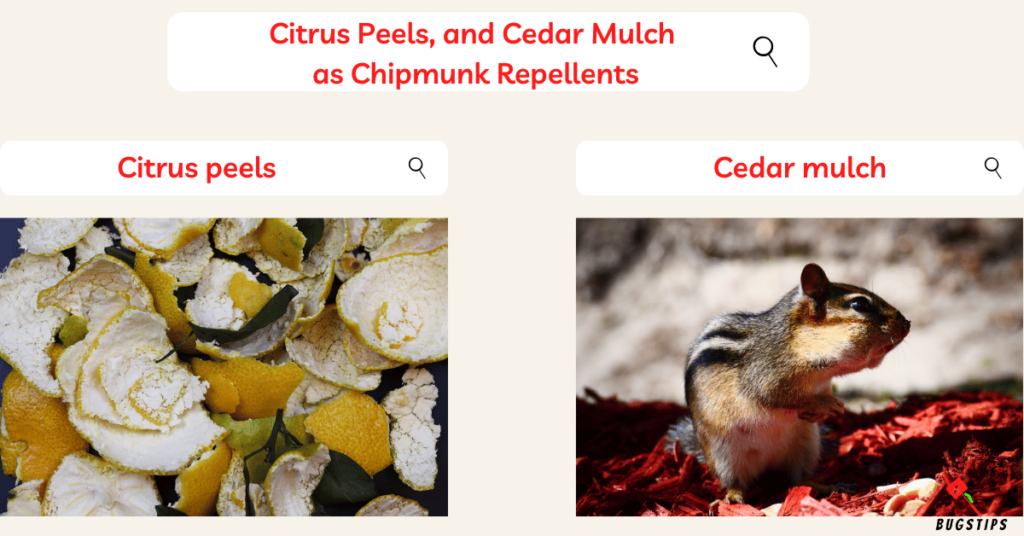
Citrus peels and cedar mulch are two natural substances that are believed to have repellent properties against chipmunks.
Citrus peels can be used as a chipmunk repellent due to the strong scent of citrus that they emit.
This scent is thought to be unpleasant to chipmunks and can keep them away.
To use citrus peels, simply place them around areas where chipmunks are active, such as gardens or flower beds.
Also, you can blend the citrus peels with water to create a spray that can be applied to the affected area.
Cedar mulch is another natural substance that can be used to repel chipmunks. The strong scent of cedar is thought to be unpleasant to chipmunks and can keep them away.
To use cedar mulch, spread it around areas where chipmunks are active, or create a cedar oil spray by mixing cedar oil with water and spraying the solution around the area.
You May Also Like – How to Keep Earwigs Out of Sandbox
Using Plants to Repel Chipmunks
Plants can play a significant role in repelling chipmunks and keeping them away from specific areas.
Certain plants, such as marigolds, hyacinths, lavender, and daffodils, have properties that chipmunks find unappealing.
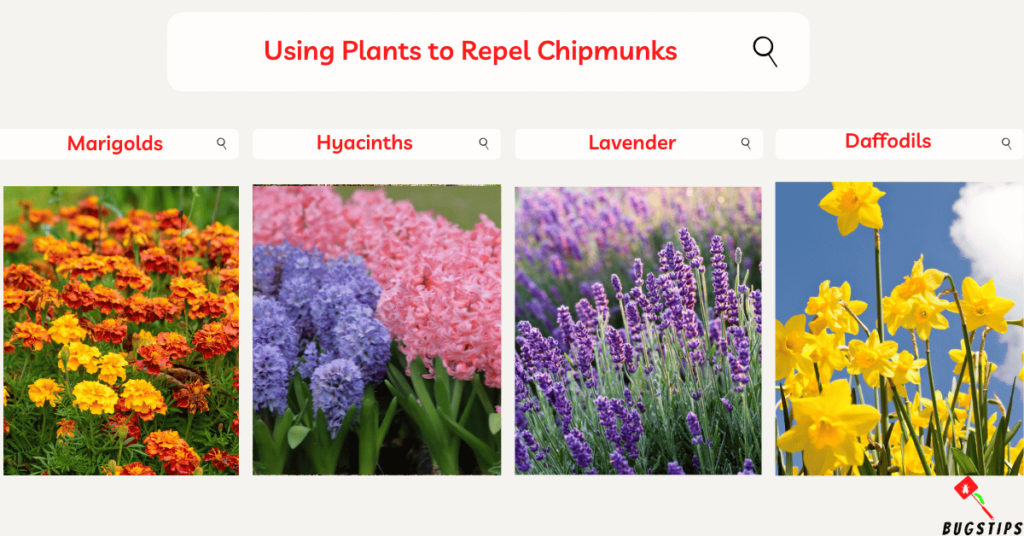
- Marigolds
- Chipmunks tend to avoid marigolds due to their strong scent.
- The pungent aroma of marigolds acts as a natural repellent, discouraging chipmunks from venturing into areas where these flowers are present.
- Hyacinths
- Hyacinths possess a powerful fragrance that chipmunks find unpleasant.
- Planting hyacinths around vulnerable areas can help create a barrier that deters chipmunks from approaching.
- Lavender
- Lavender is known for its soothing scent, but chipmunks are not fond of it.
- The strong aroma of lavender acts as a deterrent, making chipmunks less likely to venture into areas where lavender plants are growing.
- Daffodils
- Chipmunks find the smell of daffodils unappealing, making them a useful addition to your chipmunk deterrent strategy.
- Planting daffodils in areas prone to chipmunk activity can help discourage their presence.
Related Article – 15 Powerful Plants That Repel Earwigs Naturally
If you plant these specific plants in your garden, it can make the environment less attractive to chipmunks.
This can help reduce their presence and prevent them from causing damage to your property.
Does Urine Repel Chipmunks?
Urine, particularly predator urine, has been suggested as a potential chipmunk repellent.
The idea behind using urine as a deterrent is that the scent of predators can trigger fear and discourage chipmunks from entering certain areas.
While the effectiveness of urine as a chipmunk repellent is debated, some homeowners have reported positive results.
Here’s how you can use urine to potentially repel chipmunks.
Predator Urine
Predator urine, such as that from foxes, coyotes, or bobcats, can be purchased from certain retailers specializing in wildlife control products.
To utilize predator urine, follow the instructions provided by the manufacturer.
Typically, you’ll need to apply the urine near chipmunk activity areas or around the perimeter of your property.
The scent of predator urine may create an illusion of danger and discourage chipmunks from approaching.
Personal Urine
Some people have tried using their own urine as a chipmunk repellent.
While this approach may seem unorthodox, it is based on the theory that the scent of a human can be perceived as a potential threat by chipmunks.
If you choose to use personal urine, take precautions to ensure proper hygiene and avoid direct contact with the urine.
Apply the urine near chipmunk activity areas, taking care not to contaminate plants or sensitive surfaces.
While urine has been suggested as a potential repellent, it’s essential to consider the potential drawbacks and limitations.
Using urine as a repellent may not provide a permanent solution, and its effectiveness may decrease over time as chipmunks become accustomed to the scent
If you're considering using urine as a chipmunk repellent, it may be beneficial to combine it with other deterrent methods or consult with a wildlife control professional for more effective and sustainable solutions.
Other Methods to Repel Chipmunks
In addition to plants and natural scents, there are several other methods you can use to repel chipmunks from your property.
Here are some methods you can try.

- Mothballs
- Mothballs contain strong-smelling chemicals that chipmunks find unpleasant. To use mothballs as a chipmunk repellent, place them strategically around the areas where chipmunks are active or where you want to prevent their presence.
- Ensure that the mothballs are placed in secure containers or small cloth bags to prevent direct contact with soil or plants. It’s important to note that mothballs should be used with caution and kept out of the reach of children and pets due to their toxicity.
- Mothballs contain strong-smelling chemicals that chipmunks find unpleasant. To use mothballs as a chipmunk repellent, place them strategically around the areas where chipmunks are active or where you want to prevent their presence.
- Ammonia
- The strong odor of ammonia can act as a deterrent for chipmunks. To use ammonia as a repellent, soak rags or cotton balls in ammonia and place them near chipmunk entry points or areas where they are causing damage.
- Be careful not to directly apply ammonia to plants or delicate surfaces, as it can cause damage. Replenish the ammonia-soaked items regularly to maintain a strong scent.
- The strong odor of ammonia can act as a deterrent for chipmunks. To use ammonia as a repellent, soak rags or cotton balls in ammonia and place them near chipmunk entry points or areas where they are causing damage.
- Epsom Salt
- Epsom salt can be an effective chipmunk repellent due to its bitter taste. Sprinkle Epsom salt around the areas where chipmunks are active or where you want to discourage their presence.
- Focus on entry points, garden borders, or areas near their burrows. The salt will create an unfavorable taste for chipmunks, deterring them from venturing into treated areas. Reapply the Epsom salt after rain or when it has been washed away.
- Epsom salt can be an effective chipmunk repellent due to its bitter taste. Sprinkle Epsom salt around the areas where chipmunks are active or where you want to discourage their presence.
- Soap
- Strong-smelling soap can be another tool to repel chipmunks. To Use soap as a repellent, grate-scented, or deodorant soap, and scatter the shavings in chipmunk-prone areas.
- The scent will help create an environment that chipmunks find unappealing. Reapply the soap shavings as needed to maintain the scent.
- Strong-smelling soap can be another tool to repel chipmunks. To Use soap as a repellent, grate-scented, or deodorant soap, and scatter the shavings in chipmunk-prone areas.
When using these methods, it’s important to remember that they may not provide a foolproof solution.
Chipmunks can become accustomed to certain scents over time, reducing the effectiveness of the repellents.
Related Article – How to Keep Earwigs Out of Sandbox
It may be necessary to rotate or combine different methods to enhance their efficacy. Additionally, it’s crucial to consider the safety and environmental impact of these repellents and use them responsibly.
Final Thoughts
With the scents that repel chipmunks, you can create an inhospitable environment for these critters without resorting to harmful measures.
Whether you opt for peppermint oil, mothballs, or natural odors like garlic and citrus, incorporating scent deterrents into your chipmunk control strategy can help protect your garden, yard, or home.
Remember to refresh the scents regularly and combine them with other preventive measures for the best results. Enjoy a chipmunk-free space while ensuring the well-being of these charming creatures.
FAQs
What is the best homemade chipmunk repellent?
While there are several homemade chipmunk repellents, their effectiveness may vary. Some commonly recommended homemade options include using scents like peppermint oil, vinegar, garlic, or cayenne pepper. However, it’s important to note that the effectiveness of homemade repellents may not be as reliable as commercially available products.
Do chipmunks hate the smell of mint?
Yes, chipmunks generally dislike the smell of mint. Peppermint oil, in particular, is often used as a natural repellent to deter chipmunks and other pests. Placing cotton balls soaked in peppermint oil near chipmunk entry points or in areas of activity may help keep them away.
Does baking soda repel chipmunks?
Baking soda is not typically known to repel chipmunks. While it may have various household uses, there is limited evidence to suggest that baking soda can effectively deter chipmunks.
Does garlic repel chipmunks?
Yes, planting garlic can help repel chipmunks from your garden.
Does Irish Spring soap repel chipmunks?
Yes, the fragrance of Irish Spring soap appears to be highly repellent to chipmunks and many other mammals besides.
Does salt deter chipmunks?
Yes, Epsom salts and soap, when diluted with water, can serve as an excellent and inexpensive chipmunk repellent.
Does cayenne pepper deter chipmunks?
Yes, you can use cayenne pepper to make a spray bottle solution to use for your plants as a chipmunk deterrent.
Does coyote urine repel chipmunks?
Yes, coyote urine is another option to repel chipmunks, as it repels a wide range of animals and pests.
What are some other chipmunk repellents?
Other chipmunk repellents include peppermint essential oil, spicy powders like cayenne and chili powder, and homemade sprays made from pureed garlic and hot peppers steeped in soapy water.
Resources – (for further reading)
University of Georgia – Chipmunk Control
University of Missouri – Controlling Nuisance Chipmunks

